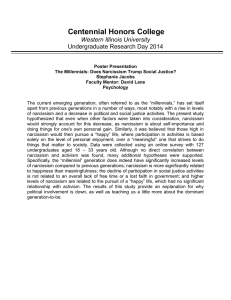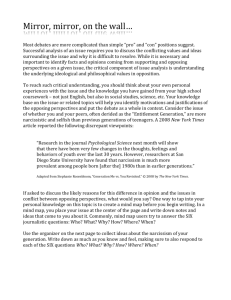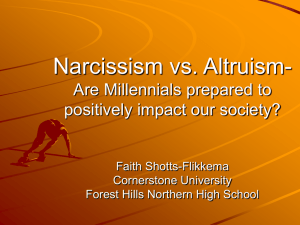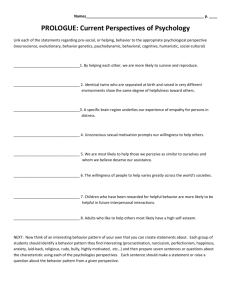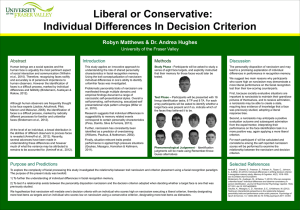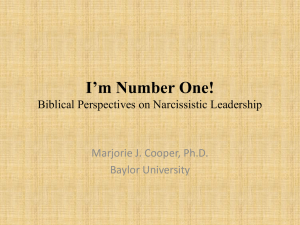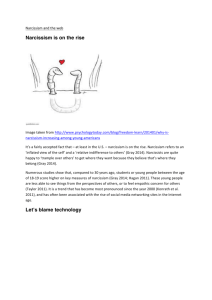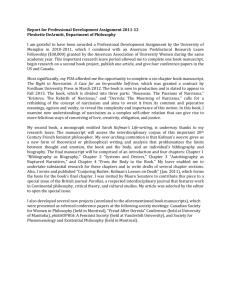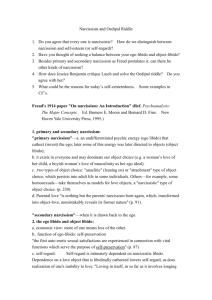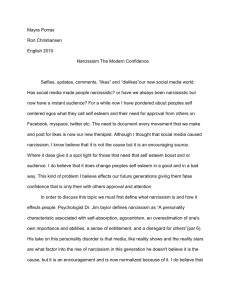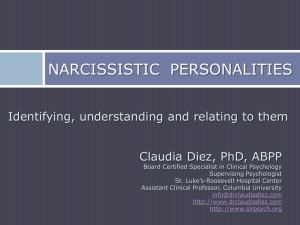Narcissism: Is there a bright side to this dark trait?
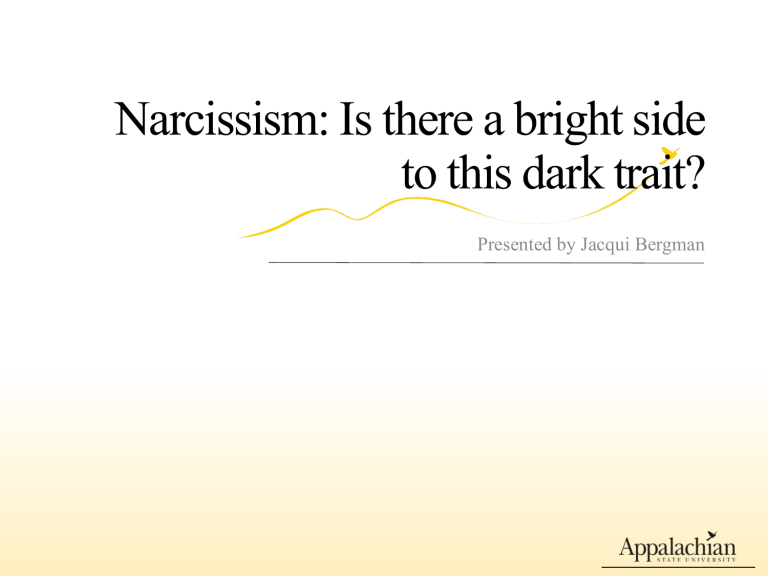
Narcissism: Is there a bright side to this dark trait?
Presented by Jacqui Bergman
“Research reveals upside of CEO narcissism”
A new study shows self-centered CEOs who “crave acclaim and applause” are more likely to keep their companies at the forefront of technological innovation. Additionally, the desire for attention from self-absorbed CEOs fuels the willingness to make daring decisions that less confident counterparts might shy away from, especially during a period of radical change.
Lausanne, Switzerland, November 17, 2011 / PRNewswire
Other researchers have discussed:
“Constructive” narcissism (Sosik, Chun, & Zhu, 2014)
“Healthy” narcissism (Bentley, 2005)
“Productive” narcissism (Maccoby, 2003)
The bright side?
Confidence
Self-esteem
Charisma
Extraversion
• Sociability
• Assertiveness
Narcissism at a glance
A pervasive pattern of activities, behaviors, or experiences that serve to maintain or enhance a grandiose, yet vulnerable self
• Exaggerated feelings of self-importance
• Sense of entitlement
• Grandiosity in beliefs and behavior
• Excessive need for admiration
• Lack of empathy
Looking a little more closely…
A clinical personality disorder
A subclinical personality trait
Difference is essentially one of degree
Subclinical narcissism is most often measured using the NPI – designed to assess subclinical narcissism, but based directly on the DSM-III criteria
Narcissism and the DSM-III
(1980)
A.
Grandiose sense of self-importance or uniqueness
B.
Preoccupation with fantasies of unlimited success, power, brilliance,
beauty or ideal love
C.
Exhibitionism
D.
Cool indifference or marked feelings of rage, inferiority, shame,
humiliation, or emptiness in response to criticism , indifference of
others, or defeat
E.
At least two of the following characteristic disturbances in interpersonal
relationships:
1) Entitlement : expectation of special favors without assuming
reciprocal responsibilities
2) Interpersonal exploitativeness
3) Relationships that characteristically alternate between two
extremes of overidealization and devaluation
4) Lack of empathy
Narcissism and the DSM-V
(2013)
A.
Significant impairments in personality functioning manifest by:
1.
Impairments in self functioning (a or b) a) Identity – excessive reference to others for self-esteem; exaggerated self-appraisal b) Self-direction – personal standards are unreasonably high to see oneself as exceptional, or too low based on entitlement
2.
Impairments in interpersonal functioning (a or b) a) Empathy – impaired ability to recognize or identify with feeling and needs of others b) Intimacy – relationships largely superficial and exist to serve selfesteem regulation
B.
Pathological personality traits in the following domain:
1.
Antagonism , characterized by: a) Grandiosity – feelings of entitlement; self-centeredness; condescending b) Attention seeking – excessive attempts to attract the focus of attention of others
Its nomological network
Aggression (+)
Self-esteem (+)
Machiavellianism
(+)
Narcissism
Extraversion (+)
Psychopathy (+)
Neuroticism (-)*
Agreeableness (-)
So… is there a bright side?
Research indicates that narcissists:
Need constant affirmation and adulation
Ignore the advice of others
Take unnecessary and excessive risks
Are extremely sensitive to criticism or slights and cannot tolerate dissent
Readily take credit for success and pass blame for failure
Quickly emerge as leaders, but are not any more effective as leaders than non-narcissists
Going forward…
Be careful and specific with conceptualizations of narcissism
• Suggestion (Horney, 1939) – the term “narcissism” should be restricted to unrealistic self-inflation, and distinguished entirely from healthy self-esteem
Re-examine and improve the measurement of subclinical narcissism
My recommendation
If you want extraverted, confident, charismatic employees/leaders, then hire and promote people who are extraverted , confident , and charismatic .
Hiring/promoting a narcissistic may get you these qualities, but it will also get you a lot of negative qualities that will very likely outweigh any positive.
